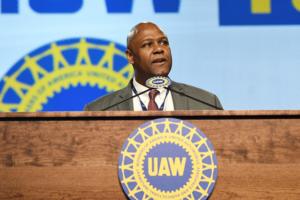Automotive
/Home & Leisure

Trump EPA moves to nix key Obama-era finding, last remaining tailpipe emission rules
WASHINGTON — The Trump administration moved Tuesday to eliminate the last major environmental regulation on the U.S. auto industry.
The long-expected step came via a proposal to eliminate a key 2009 finding that enabled the U.S. Environmental Protection Agency to regulate greenhouse gas emissions. The repeal of that finding could trigger a ...Read more

Ford secures $3B line of credit amid fluctuating environment
Ford Motor Co. has secured a $3 billion line of credit ahead of another tariff deadline on Friday and amid shifting policy around fuel economy regulations.
The Dearborn automaker can draw upon the funds as it wishes for a year, and it must maintain at least $4 billion in cash during that period, according to the Tuesday filing with the ...Read more

Stellantis reinstates 2025 guidance as new CEO predicts 'tough decisions'
Promising recovery under a new CEO, Chrysler parent Stellantis NV on Tuesday reinstated its annual guidance that in the second half of the year, it will post higher net revenue than in the first half and a low single-digit operating income margin.
The forecast starts providing a picture of what the transition led by Antonio Filosa, who took ...Read more

Shopping for an electric vehicle? How long until that $7,500 tax credit expires?
Michael Buday has one eye on the calendar as he makes plans to purchase a used Tesla. The Orange County, California, resident has two months left to take advantage of a federal tax credit that could save him thousands of dollars if he buys an electric vehicle.
The federal government will stop paying a $7,500 incentive for new electric vehicles ...Read more

Motormouth: Aww, nuts!
Q: I just took my 2017 Jeep Compass to the dealer for an oil change and tire rotation. The mechanic said he couldn't do the rotation because all the lug nuts were swollen, due to water that had been behind them, and they could not be put back on after a rotation. Cost: $400, or about $20 per lug nut.
How did water stay there and do damage? I ...Read more

'Trying to be Jeeps': Why automakers are leaning into off-roading trims
Brawny SUVs like the Jeep Wrangler, Toyota Land Cruiser and Ford Bronco were once among a handful of vehicles that came ready to tackle mud, rocks and sand as soon as they left the factory.
Now, carmakers are increasingly adding many of the same stock off-roading features to all types of models: mild-mannered crossovers, three-row family ...Read more

Tesla will start testing its robotaxis in the Bay Area, report says
Elon Musk may be bringing his robotaxis to the Bay Area soon to compete head to head with the other leaders in the driverless vehicle market.
Tesla plans to launch an invite-only service in the Bay Area as soon as this weekend, according to a Business Insider report citing an internal company memo.
The move comes about a month after Tesla ...Read more

Auto review: The 2025 Toyota 4Runner may be new, but remains familiar
For the first time in 15 years, there’s a new Toyota 4Runner. And while the 2025 edition may be new, it remains what it’s always been: a steel box standing on its toes with the long-term survival instincts of Cher.
Having hibernated without a significant change since the debut of the Apple iPad, the 2025 Toyota 4Runner no longer seems as if...Read more

Auto review: 2025 Ford Maverick Lobo brings a new flavor to the market
As the truck market has continued to grow and develop, consumers have continued to demand more and more of manufacturers. In recent years, Ford released the Maverick, a small compact pickup aimed at drivers with honey-do lists, and took a big gamble by using a previously failed nameplate. In typical Ford fashion, they have capitalized on the ...Read more

Auto review: Second-gen Tesla Model 3 Performance takes big leap forward (and a step back)
CHARLEVOIX, Michigan — After not touching the steering wheel on Full Self-Driving for an hour and a half up I-75, I exited the freeway at Gaylord. Turning on to the M-32 twisties, I took back the controls — my left thumb searching for the turn signal — from Autopilot. ZOT! The sedan rocketed past 60 mph in less than three seconds, its ...Read more

Tesla stock dips as second-quarter earnings reduce investor confidence
Tesla shares tumbled Thursday after its latest earning results knocked the wind out of investors' confidence in Elon Musk's electric vehicle maker.
The company has been facing intense competition, cooling consumer interest and a reduction of the government incentives that made buying EVs more affordable.
Musk, the chief executive, broadcast ...Read more

Winners, losers, movers: Highlights of US auto sales six months in
There's never a dull moment in the U.S. market as automakers hustle to divine consumer trends, navigate federal regulations, juggle tariff-driven plant production, and dodge activist Molotov cocktails.
The first six months of 2025 saw robust sales on track for an annual 16.3 million in unit sales as gas prices dropped and tariffs rose. America�...Read more
The US has long wanted to sell more cars in Asia. Do Asian consumers want them?
In the early 2000s, an observant driver might have noticed an unusual sight on South Korean streets: Some of the police cars were American-made Ford Tauruses.
Although South Korean patrol cars were normally supplied locally by Hyundai or Kia, the Tauruses were there as a goodwill gesture from the South Korean government, which bought 100 of ...Read more
GM reports $3 billion in profits between April and June
General Motors Co. brought in $3 billion in adjusted pre-tax earnings between April and June, the company announced Tuesday.
GM said earnings in the second quarter reflect a more than $1 billion hit from President Donald Trump's tariffs, "reflecting minimal mitigation offsets." For comparison, GM earned close to $3.5 billion in the first three ...Read more

Ex-UAW President Ray Curry calls on Reuther Administration Caucus, criticizes current leaders
Former United Auto Workers President Ray Curry accused the current union's leadership of "fear, intimidation and retaliation" in a letter sent to retired officers and regional directors seeking interest in a video call on the future of the Reuther Administration Caucus a year out from the next Constitutional Convention.
The letter obtained by ...Read more

Stellantis reports $2.7 billion loss thanks to tariffs, restructuring, slow sales
Stellantis NV reported a preliminary loss of $2.7 billion (2.3 billion euro) for the first half of this year amid President Donald Trump's tariffs and as the global automaker's sales continued to sputter.
The early results — a full earnings report comes July 29 — show how the transatlantic parent of Jeep, Ram and Fiat remains deep in ...Read more

Some fear Chinese automakers' playbook is existential threat to US auto industry
DETROIT — Aggressive component-sharing efforts have contributed to lower cost structures at many Chinese automakers, and there's an increasing push for Western automakers to catch up.
The strategy stretches from internet-connected vehicle technologies and electric vehicle powertrain systems to actuators and even engines that once defined ...Read more

Slate shows its bare-bones, 'mid-$20s' EV truck at Detroit summit
DETROIT — Slate Auto, the Michigan electric vehicle startup backed by Amazon founder Jeff Bezos, has publicly touted a starting price for its pickup of "under $20,000" since coming out of stealth mode in April.
But that was before President Donald Trump's big tax and domestic policy bill was signed into law on July 4, halting the $7,500 tax ...Read more

Motormouth: Chimes and tracks?
Q: To address the recent column regarding “Car chimes over railroad tracks,“ I've noticed a chime about 20-50 yards before railroad tracks. The warning occurs only when I have Waze on. This does differ a bit from the recent article stating the chimes occur when crossing tracks, suggesting that the writer’s experience might be different ...Read more

Trump's auto loan tax break could save working class buyers thousands, experts say
WASHINGTON — A Trump-backed tax holiday on auto loan interest payments could save middle-class Americans several hundred dollars apiece on new U.S.-built vehicle purchases through 2028, according to industry experts.
The break comes via a provision in the Republicans' One Big Beautiful Bill Act, a massive tax cut and spending package signed ...Read more
Popular Stories
- Shopping for an electric vehicle? How long until that $7,500 tax credit expires?
- Motormouth: Aww, nuts!
- 'Trying to be Jeeps': Why automakers are leaning into off-roading trims
- Stellantis reinstates 2025 guidance as new CEO predicts 'tough decisions'
- Tesla will start testing its robotaxis in the Bay Area, report says






